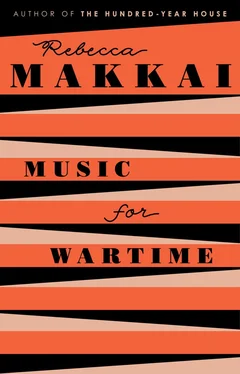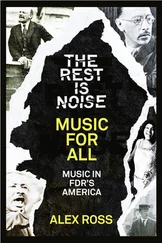There was something about their body language that she didn’t like, something about the way they both stood with their weight to one side, one hip jutting out, that felt angry and unpleasant — as if she’d done exactly the wrong thing. The older woman said something, and they both laughed. Celine could tell even from up here that it was a bitter laugh, a sixth-graders-on-the-playground, sarcastic sort of laugh. The older one took the note and ripped it into pieces, and walked to Celine’s car. She lifted the windshield wiper and stuck the shreds underneath it, like some perverse flier.
The women took little plastic pumpkins out of their box and spent the next half hour sticking them around the cross.
Celine decided she’d e-mail the rest of the quartet in the morning: “What do I do now? Does this give me the right to be mean?”
Over the past month, both Mikes had become more and more comfortable, at least via e-mail, with expressing their opinions. Mike Cho had been brave enough to shoot down Gregory’s Haydn idea before Celine could veto it herself. Julie, meanwhile, was nagging them all to come into the city and have photos taken. Celine knew it was important, that Julie couldn’t start any publicity without it, but she kept putting it off. She was busy, truly, and she was getting ready for Vienna, and there were student recitals. But mostly she didn’t want to pose in a little row, staring seriously at her cello, turning red from her proximity to Gregory. She was like one of those apocryphal native people, worried the camera would steal her soul. Or at least, in this case, expose it.

That night Celine was playing Saint-Saëns in the living room, sitting on one of the same four chairs that had remained in a vacated semicircle for the past month, when the doorbell rang. She had wanted so badly to talk to the women before, but now it was dark, and she knew they were angry. They’d had enough time to go home and come back with Lord knows what. Weapons, or pictures of the dead girl. She held her bow in front of her like a saber and sat perfectly still in her chair. They rang the bell again, and then again, and then they started knocking, loud and fast. They’d have heard the cello through the door, and if the sheriff was willing to tell a perfect stranger on the phone about the “oriental lady musician,” he’d surely told these women the same thing at some point in the paperwork process. He’d probably added “famous” and “rich,” neither of which was really true in the grand scheme of things, but that was her reputation in town.
The knocking was odd and irregular, and she wondered if they had come back with the girl’s drunken father. Or sent him alone. And she deserved their spite, she realized. How condescending must it seem, for the lady in the big house to offer to buy something nicer? Excuse me, could I please make your grief a little more tasteful?
It took her a good half a minute to realize the knocking wasn’t irregular at all. It was the William Tell Overture, in perfect rhythm. She stood and walked slowly to the door, bow still perpendicular to her stomach. She called, “Lev?”
“No.” The voice was familiar and vaguely hurt, and the knocking stopped. She opened the door and there was Gregory, his violin case and his duffel bag at his feet, as if he’d never gone anywhere at all.
He said, “I come to plead sanctuary. I saw your cross out front. This is a church, correct?”
And what could she do but laugh and invite him in? She made a pot of coffee, and he lit a fire with the wood left from September, and the whole time she didn’t ask what he was doing there, and he didn’t offer an explanation. She wanted to ask if he thought he was in a movie, that he could just show up at someone’s door expecting love or sex or friendship, or whatever he was after. But there were worse kinds of movie.
They pulled the couch up to the fireplace, and she told him about the note that was still out there under her windshield wipers.
Gregory said, “And I showed up the same day? It’s a sign.”
Instead of asking what it was a sign of , Celine said, “I don’t believe in signs.” She was holding her cup in both hands, grateful to have a fire to look at.
“Sure you do.” She didn’t answer, and so he said, “You must, because you believe in music.”
“But you came today on purpose. Did you figure it out, about the anniversaries?”
He put his coffee on the floor and finally unbuttoned his thin coat. “I came because I have another solution. I think you should leave this place.”
“That’s ridiculous.”
“You don’t seem happy here, and there’s no good answer to the cross problem, and I want you to know you’re welcome to stay with me in the city. Just for a while. A week. A month. Longer, if you want.”
“I teach, you know. At the college.”
“Which is closer to the city than to this house.”
The warmth was getting too much for her, between the hot cup in her hands and the fire, and the blood roaring through her face.
“You’ve exiled yourself out here, and I don’t know why. Come live with me and be my love , as they say.”
“Who says that?”
“I do. I just did.” He laughed, and she refused to look at him, she absolutely refused, but she could hear his fingers touching his beard. She could see his brown shoes, stretched toward the fire.
“Gregory, I’m an adult. I can’t run away from my problems.”
“But,” he said, “wasn’t that what you were doing when you bought this house?”
“So I should just run away again.”
“Think of it as running toward something.”
“What, I’m Cinderella, and you’re going to sweep me away in a pumpkin?”
He leaned so far into her field of vision that she couldn’t help but see him. “We’ve been over this. You’re Snow White.”
She said, “Listen. You’re crazy, but I’m not insulted. I will forget, for the sake of the quartet, that you ever presumed to tell me what to do with my life. The old folks shouldn’t quarrel in front of the children.” She didn’t add that she was terrified. That she was tired of running in any direction, away from things or toward them. That maybe the reason she’d bought this house, so big and solid and remote, was the hope that it would keep her pinned down in one spot for the rest of her life, where she wouldn’t have to make decisions. That the cross bothered her so much because it was a wedge in her perfect isolation — an invasion.
She brought Gregory a bowl of butternut squash soup and a glass of wine. They tried some of Bach’s two-part inventions, but they had no sheet music and they couldn’t remember any through to the end. Celine kept trying to sing Gregory’s part, to remind him, and they’d both end up laughing.
She said, “The bad news is, your sheets are dirty. The good news is, it’s your own dirt.”
He said, “See? Another sign.” And he went up to bed without even trying to kiss her.

Celine stayed down to make sure the fire was fully dead. She straightened Gregory’s shoes by the door so they lined up perfectly with her own, and she made sure all the doors were locked. She sat back on the couch, and at that very moment the last log tumbled forward against the grate, shooting up a shower of sparks.
If she still believed in signs, they would indeed be clear today: the dying fire, the scene of death on the lawn, the ripped-up note under her wipers. Time to move on. And here was Prince Charming on her doorstep with his fiddle. What other sign could she be waiting for? Except, perhaps, the one that would make her believe in signs again at all.
Читать дальше













